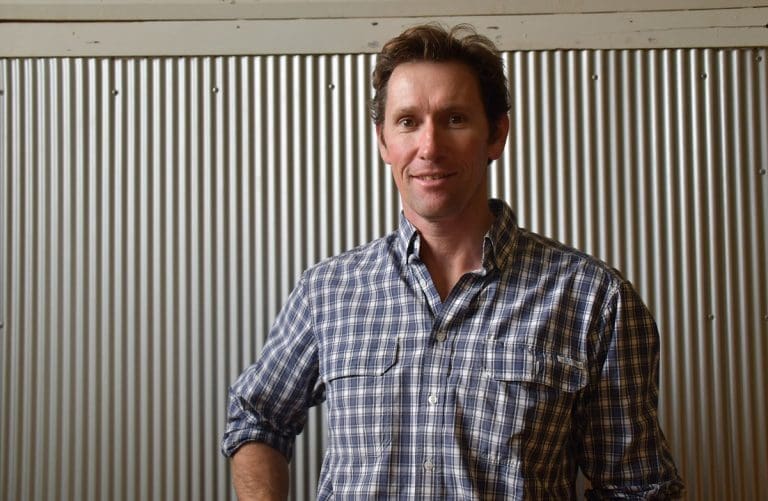Latest listings on Jobs Central recruitment page:
- 2020 graduate program (Mort & Co Lotfeeders)
- Product & compliance manager (Mort & Co Lotfeeders)
- Program co-ordinator – Sustainable Land Management (Southern Gulf NRM)
- Administration leading hand (Mort & Co)
- Station manager (Gulf Coast Agriculture)
- Sales representative – Irrigation (Total Eden)
- Mill foreperson (JBS Caroona feedlot)
- Feeding/milling team operator (Stanbroke)
- Marketing consultant (AuctionsPlus)
- Operations manager (MDH Wallumba feedlot)
Click here to access these and other exciting meat and livestock supply chain jobs currently listed on Jobs Central.

NSW grain and cotton grower Gus O’Brien understands when it’s dry and finances are tough, people start scrutinising labour costs, but he advocates “doing whatever you can” to keep key employees. (Photo GRDC)
NEW South Wales grain and cotton grower Gus O’Brien has a straightforward philosophy when it comes to successful staff retention: ‘Pay well, provide reasonable accommodation and give them some rein’.
Mr O’Brien employs two full-time staff, complemented by five to six casuals during busier times on his 7000-hectare aggregation of owned and leased land, which has a mix of irrigated and dryland farming, near Warren in the state’s central west.
“I work on having two key people, who are very capable and can oversee most parts of the day-to-day operation, but at full capacity we need eight to nine people, so the slack is taken up by backpackers and local contractors,” he said.
“When it’s dry and finances are tight, I know most of us look closely at our labour costs, but I would recommend doing whatever you can to hold onto your key staff.
“Importantly, involve them in the conversations about your strategy for getting through the drought. Ask for their input. Remind them you value their opinions and you are in this together looking for solutions that will help you all through.”
Speaking at a Grains Research and Development Corporation ‘Dealing with the Dry’ forum, Mr O’Brien said he had worked hard selecting the right people for his permanent crew and ensuring they had the skills, and or training, to do their job successfully.
“These days I spend 50 percent of my time in the office, so I have people I can trust doing a lot of the operational work and the key to making that work is stepping back and giving them some rein to do what they do well,” he said.
“I try not to stick my head in too much, but we do have weekly meetings.
“My strategy is to employ great people and work to make myself redundant. Of course, it is my business and it will always be my business, so I want to oversee what’s going on, but the best way to do that is to have the right people working with you.”
Ongoing dry conditions have reduced the area under crop this year on the farm, so Mr O’Brien has little need for more than two permanent employees, but he is confident activity will ‘ramp up again with rain’.
“I have intentionally structured my workforce so when things are tough, I have the flexibility to unload casual employees, but I am committed to keeping my full-timers.”
When it comes to securing and retaining permanent staff, he offers this advice to potential ag sector employers:
- Pay them well
- Provide reasonable accommodation
- Offer them opportunities for further learning and training, and
- Include and encourage them to have input into business decisions.
Most seasons Mr O’Brien also employs a temporary team, primarily backpackers who come via word of mouth or through social media sites, such as Gumtree.
These staff tend to stay between three and six months and in Mr O’Brien’s experience finding the best fit for his farming operation has involved:
- Employing backpackers who are over 21 years of age
- Ruling out any who ring up and ask how many days they have to work to retain their visa
- Giving preference to applicants with a farming background.
“Regardless of whether you are employing permanent or casual staff, you have to be prepared to ‘sell’ your business, for example let them know you have quality machinery and good accommodation,” Mr O’Brien said.
“Once they’re hired you really need a workplace health and safety induction process. In our operation we have identified vehicles as presenting the most risk, so we have two strict rules: wear a seatbelt and no mobile phones while operating any vehicle.”
In summary, Mr O’Brien said being an employer had its challenges but being the right ‘boss’ meant you attracted and kept well-trained and committed employees.
“I am always interested in how long people have stayed in positions, not backpackers or casuals because the nature of that arrangement is different, but length of time in a job reflects on both the employer and the employee,” he said.
“Being a fair, considered, reasonable boss who trusts his team, works to create an environment where employees are committed, feel valued and will go out of their way to make sure jobs are done well.
“Once you establish that sort of rapport and relationship you want to do everything you can to keep those people working with you, especially in tough times.”
- For more information on employing people in agriculture go to https://www.peopleinag.com.au/
Source: GRDC

HAVE YOUR SAY